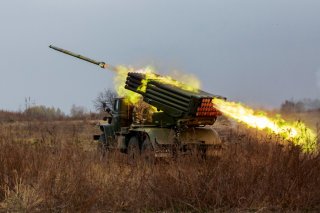Ukraine War: Putin’s Pyrrhic Victory in Avdiivka
In retaking the town, Russia’s military is taking unsustainable losses.
Avdiivka is a town in Donetsk Oblast, Ukraine, about forty-one miles from the nearest city of Kramatorsk. It once hosted a thriving coal industry and a pre-war population of 30,000, now shrunk to about 1,700. This is in part because it is currently surrounded on two sides by invading Russian forces.
After a virtual stalemate across the entire Russian-Ukrainian frontlines in 2023, President Vladimir Putin saw an opportunity for the encirclement and capture of Avdiivka. It fulfills several of Putin’s goals.
First, Putin needs a victory in Ukraine to promote his presidential re-election in March 2024. The glory that followed the annexation of Crimea in 2014, when his approval rate hit 85 percent, seems a very distant memory. Accordingly, on October 6, parts of the Russian 1st Guards Tank Army and the 41st Combined Arms Army from Siberia began to bombard the Avdiivka with artillery and aircraft. Four days later, they launched a concentrated attack consisting of a half-dozen motor rifle brigades and regiments against the two-brigade-strong Ukrainian garrison. Since then, in head-on attacks, they have suffered 4,000 casualties and have lost an incredible 118 pieces of military equipment in just six days (October 10 to 16). This includes twenty-seven tanks, thirty-three infantry fighting vehicles, and eight armored personnel carriers. These are conservative estimates. But still, the Russians press on, often passing rows of destroyed vehicles and the unclaimed bodies from previous attacks (witnessed on videos available on Telegram).
Second, whatever Putin says about protecting the Russian speakers of Luhansk and Donetsk, his main priority is to hold onto Crimea. Ukraine has made some small advances in the south that may threaten Crimea or at least put it in range of its main missile systems. Putin is hoping to draw Ukrainian forces north to defend Avdiivka, but so far, they have not taken the bait. In Avdiivka, the Ukrainians have withdrawn, and when the Russians advance, they blast them with pre-targeted military barrages. The Russians have gained some territory in the north, mainly open fields and a large coal slag heap that resembles a moon crater.
Third, Putin craftily and cynically sacrifices Russian troops from Donetsk, Siberia, Tatarstan, and rural Rostov. His power base and voters are in Moscow and St. Petersburg. Tens of thousands of Russian ethnic minorities have fled Russia to escape the draft. The Donetsk People’s Republic’s 1st Army Corps and the 20th Motorized Rifle Division from Siberia both suffer heavy causalities. Putin has not forgotten how many from Rostov barely resisted the Wagner mutiny on June 23, 2023. Wagner mercenary remnants, the Arbat Battalion, is heavily engaged in Avdiivka—with heavy losses.
Putin will do anything to avoid having men conscripted from his urban power bases. Central Asian immigrants to Russia are under pressure to enlist or lose legal status. Ukrainian POWs are coerced into fighting for Russia. Citizens living in occupied Ukrainian territories are also forced to join the Russian army. Russian agents still scour prisons for convicts to join their infamous Storm-Z squads.
Avdiivka is not uncommon. The Economist created a chart that shows Putin’s reliance on conscripts from poor and remote areas of the country, such as Chechnya, Krasnoyarsk Krai (Siberia), and Dagestan, for quite a while. Molfar, an open-source intelligence-gathering group, goes as far as describing this as a form of ethnic cleaning.
Currently, with the rainy Autumn season underway, Russia is consolidating its gains by building defensive lines. The battle for Avdiivka will likely continue into 2024. Thousands more will die. Russia may eventually capture the shattered town—a pyrrhic victory for Putin. In the long term, Caucasus and Siberian minorities may question their sacrifices. The angry Muslim “flash-mob” that stormed Makhachkala airport in Dagestan on October 29 should be a warning to Moscow, even if their intentions were anti-semitic rather than anti-government. In the short term, as long Putin achieves his goals and retains power in Russia, he doesn’t care.
Patrick Drennan is a journalist based in New Zealand with a degree in American history and economics.
Image: Shutterstock.

